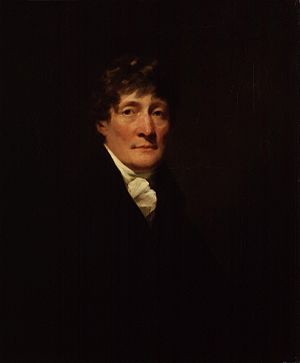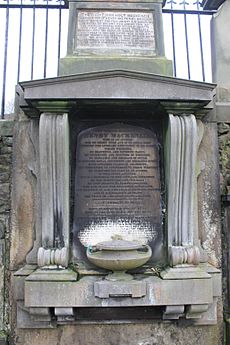Henry Mackenzie facts for kids
Quick facts for kids
Henry Mackenzie
|
|
|---|---|

Portrait of Henry Mackenzie by Henry Raeburn
|
|
| Born | July 26, 1745 |
| Died | January 14, 1831 (aged 85) Edinburgh, Scotland
|
Henry Mackenzie (born July 26, 1745 – died January 14, 1831) was a Scottish lawyer, novelist, and writer. He was born and died in Edinburgh, Scotland. People sometimes called him the "Addison of the North." This compared him to a famous English writer named Joseph Addison. Even though he is known for his books, his main job was in law. This helped him earn enough money to focus on his writing. Later in life, he had an important job as the Comptroller of Taxes for Scotland.
Contents
Henry Mackenzie's Early Life and Education
Henry Mackenzie was born in Edinburgh, Scotland, on July 26, 1745. His father, Dr. Joshua Mackenzie, was a well-known doctor. His mother, Margaret Rose, came from an old family in Nairnshire.
School and Law Studies
Mackenzie went to the High School in Edinburgh. After that, he studied law at the University of Edinburgh. He then trained with George Inglis, a lawyer who handled government legal work.
In 1765, Mackenzie went to London to continue his law studies. When he returned to Edinburgh, he started his own law office. He also worked as a lawyer for the government.
Henry Mackenzie's Writing Career
Mackenzie tried for several years to get his first book published. It was called The Man of Feeling. Publishers kept saying no. Finally, he published it without his name on it in 1771. It became an instant success!
The Man of Feeling and Other Novels
The Man of Feeling is about a kind but naive person. This character goes to London and is tricked by others. The book shows Mackenzie knew the writing styles of famous authors like Sterne and Richardson. However, the famous writer Sir Walter Scott said Mackenzie's book didn't have as good a story, humor, or characters as those other writers.
Someone else, a clergyman named Eccles, even claimed he wrote the book! Mackenzie then officially announced he was the author.
In 1773, Mackenzie published his second novel, The Man of the World. The hero of this book was very different from the "Man of Feeling." Sir Walter Scott said this hero was "constantly obedient to every emotion of his moral sense." Mackenzie's third novel, Julia de Roubigné (1777), was an epistolary novel. This means it was written as a series of letters.
Plays and Periodicals
Mackenzie also wrote plays. His first play, The Prince of Tunis, was performed in Edinburgh in 1773 and was somewhat successful. However, his other plays did not do as well.
Mackenzie was part of a literary club in Edinburgh. They would read papers written in the style of a famous newspaper called The Spectator. This led to Mackenzie starting his own weekly paper, The Mirror, which ran from 1779 to 1780. He was the editor and wrote most of the articles.
After The Mirror, he started a similar paper called The Lounger in 1785. This paper ran for almost two years. It included one of the first public tributes to the famous Scottish poet Robert Burns.
Henry Mackenzie's Public Life and Family
In 1783, Mackenzie helped start the Royal Society of Edinburgh. This is a group for important thinkers and scientists. He later became its Literary President and then Vice President.
Political Views and Role
Mackenzie was a strong supporter of the Tory political party. He wrote many articles against the ideas of the French Revolution. He often wrote under the fake name "Brutus." Most of these writings were anonymous. However, he did admit to writing a defense of William Pitt's policies. Because of his support, he was given an important government job in 1804. He became the Comptroller of Taxes for Scotland.
Family Life
In 1776, Mackenzie married Penuel Grant. They had eleven children together. In his later years, he was a well-known person in Edinburgh society. Even though he was nicknamed "the Man of Feeling," he was actually a very practical person. He had a kind heart but was also good at business.
Some of his memories about other writers appeared in his book Account of the Life and Writings of John Home, Esq. (1822). He also wrote a Life of Doctor Blacklock, which was included in a 1793 edition of the poet's works.
Homes in Edinburgh
In 1805, Mackenzie lived in a large house in George Square. In 1806, he moved to a newly built house at 6 Heriot Row. He was the first person to live there and stayed until he died. His house at Heriot Row was larger than the houses next to it.
Henry Mackenzie's Later Years and Death
In 1807, a collection of his works was published without his permission. So, he then oversaw the publication of his own Works (8 volumes, 1808). Sir Walter Scott wrote a very positive review of Mackenzie's novels in 1823.
Family Connections
Mackenzie's marriage to Penuel Grant made him an uncle to Lewis Grant-Ogilvy, 5th Earl of Seafield. His oldest son, Joshua Henry Mackenzie (1777–1851), became a judge. He is buried with his father. Two other sons, Robert and William, worked for the East India Company. His son Holt Mackenzie was also an important administrator for the East India Company.
He also had two daughters, Margaret and Hope. His nephew, Joshua Henry Davidson, became the First Physician in Scotland to Queen Victoria.
Death and Burial
Henry Mackenzie died on January 14, 1831, at his home at 6 Heriot Row in Edinburgh. He is buried in Greyfriars Kirkyard, a famous graveyard in Edinburgh.
Freemasonry
Mackenzie was a Scottish Freemason. He joined a group called Lodge Canongate Kilwinning, No. 2, in Edinburgh on December 2, 1784.
Trivia
A small house in Colinton is known as "Henry MacKenzie's Cottage." This building was listed as important because of a "historical connection." However, it seems unlikely Mackenzie ever lived there. It might have been home to someone else with the same name.
Works by Henry Mackenzie
Novels
- The Man of Feeling (1771)
- The Man of the World (1773)
- Julia de Roubigné (1777)
Plays
- The Prince of Tunis (a tragedy, 1773)
- The Spanish Father (a tragedy, 1775)
- The White Hypocrite (a comedy, 1789)
Non-fiction
- Review of the Principal Proceedings of the Parliament of 1784
- Some Account of the Life and Writings of Dr Blacklock (1793)
- Account of the Life of Lord Abercromby (1796)
- An Account of the Life and Writings of William Tytler (1796)
- Account of the Life of Mr John Home Esq. (1812)
Periodicals Edited
- Editor: The Mirror (1779–1780)
- Editor: The Lounger (1785–1787)
Images for kids
 | Audre Lorde |
 | John Berry Meachum |
 | Ferdinand Lee Barnett |




